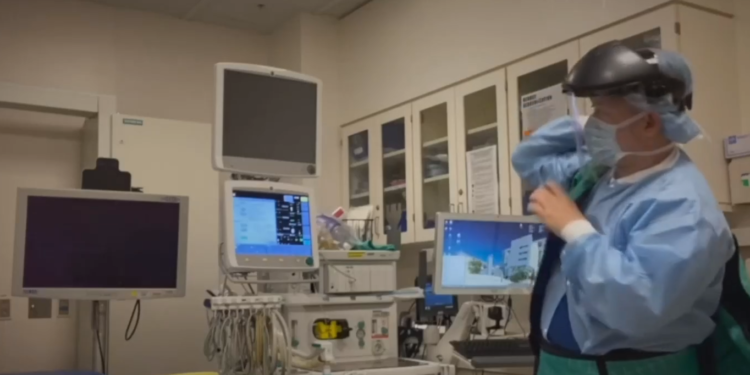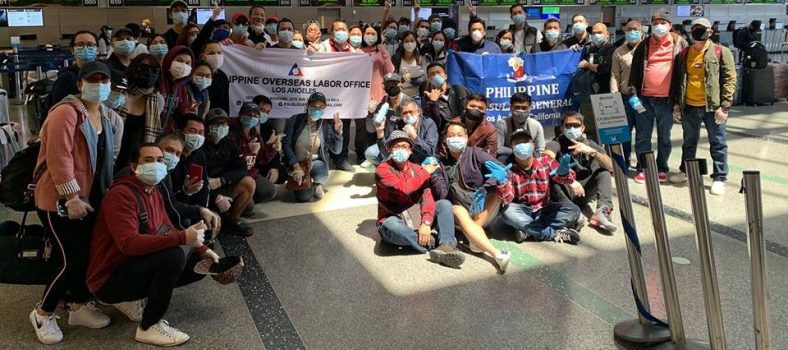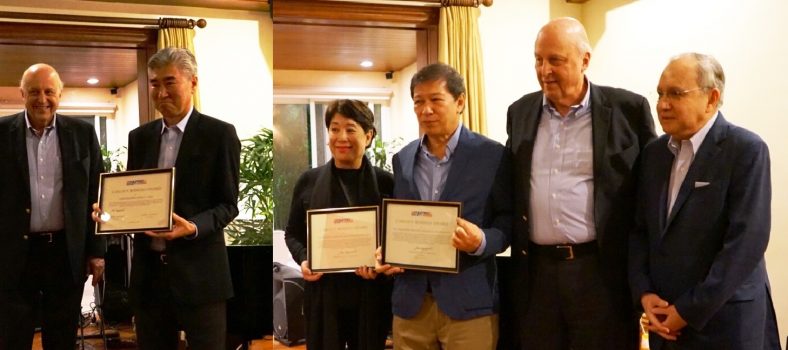Philippine Nurses in the U.S. Healthcare System
Washington, DC – A January 17 in-person forum provided an overview of the historical importance of the U.S. and Philippine professional exchanges that began in the early 20th century and a deep-dive into the complex forces behind the psyche of Philippine nurses who persevered working in the frontlines of a health crisis in the U.S.
At the turn of the century, the Philippines adopted the American educational system that paved the way for western standards of training in the medical profession. Under the visitor exchange program, returning US-trained Philippine nurses became instructors in Philippine colleges that in turn served as vital source of recruits during periods of war and health crises.
“The U.S. has increasingly relied on Filipino healthcare workers to fill medical shortages. In 2019, one in 20 registered nurses in the US are of Philippine-heritage, the largest among foreign-born nurses; in fact spanning the world over, the Philippines’ largest export are nurses,” stated Norfolk State University Professor Aprilfaye Manalang.
Reports also showed that of the confirmed 213 COVID‐19 related nurses’ deaths, a disproportionate high number of 63 representing one-third are of Filipino-descent.
In the process of her research, Professor Aprilfaye Manalang interviewed ten nurses in the Hampton Roads-Virginia Beach region to understand the relevant role that faith played in their profession and how they reckoned with the structural and cultural violence of the pandemic and the rise of anti-Asian hate. Philippine nurses expressed “emotionally, physically, and mentally stressed out, in desperation, fear, anxiety.”
Manalang observed that Filipino nurses who are mostly of Christian faith, found refuge in their religion and the teachings of forgiveness and sacrifice. As immigrants in search of economic advancement, the nurses exhibited profound belief in a sense of indebtedness or “utang na loob” for their American citizenship. On the flip side, she noted that “they feel hesitant to argue for their rights at work or to complain about any injustices, or experience of some type of discrimination or anti-Asian hate.”
Angela Librado-Trinidad, Labor Attaché of the Philippine Embassy, explained that even before the pandemic, Philippine nurses experienced occupational hazards and stressful workload environments due to staffing shortages. The pandemic exacerbated their vulnerabilities. Trinidad led the Migrant Overseas Office which facilitates accreditation of employers and staffing agencies, advocates for workers’ rights and welfare, and provides post-arrival orientation seminar in the U.S. The office received over 2,000 job requests by health facilities each year since 2020.
Georgetown University Professor Beth Ferris, Director of Institute for International Studies of Migration moderated the panel discussion which fielded questions and comments about advancing PH-US memorandum of agreement to train PH nurses and streamline the recruitment process, feminization of migration, “ungrateful refugee syndrome”, nursing unions, state-specific regulations, and overall global shortage of healthcare workers.
In his closing remarks, Executive Director Hank Hendrickson stressed the importance of the welfare of the Philippine diaspora as a foreign policy priority of the Philippine government. Increasingly, the diaspora representing over 10 million overseas workers and their families will play an important role by elevating these labor concerns to the government and their elected officials.
Following this event in Washington, US-Philippines Society directors met with President Ferdinand R. Marcos on January 30 at Malacanang Palace in Manila, where Co-chair Ambassador John D. Negroponte presented the Society’s 2023 Carlos P. Romulo Award recognizing the contributions and sacrifices of “The Filipino Nurse” during the Pandemic. Secretary of Migrant Workers Susan Ople accepted the award on behalf of the nursing community. The citation reads,
“The 2023 Carlos P Romulo award is presented to ‘The Filipino Nurse’ in recognition of the immense contribution and collective commitment by nurses of Philippine descent to public health during the Covid-19 Pandemic. These healthcare workers, who represented five percent of 3.5 million nurses working in the United States, accounted for 30 percent of those who died from Covid. Their sacrifice testifies to the critical frontline care provided, especially to the most vulnerable. For their service in protecting the lives of so many, while sacrificing so much, the US-Philippines Society is honored to recognize these unsung healthcare heroes.”
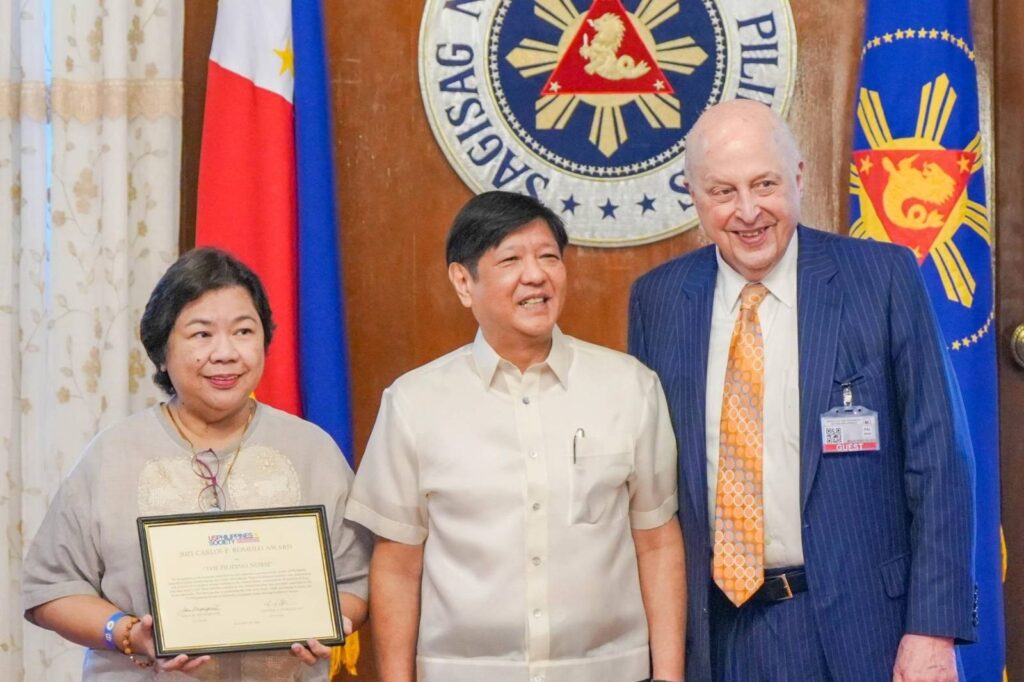
President Ferdinand R. Marcos Jr. (center) witnessed the presentation of the 2023 Carlos P. Romulo Award to “the Filipino Nurse” which was accepted by Secretary Susan Ople (left) and presented by Amb John Negroponte, January 30, 2023.
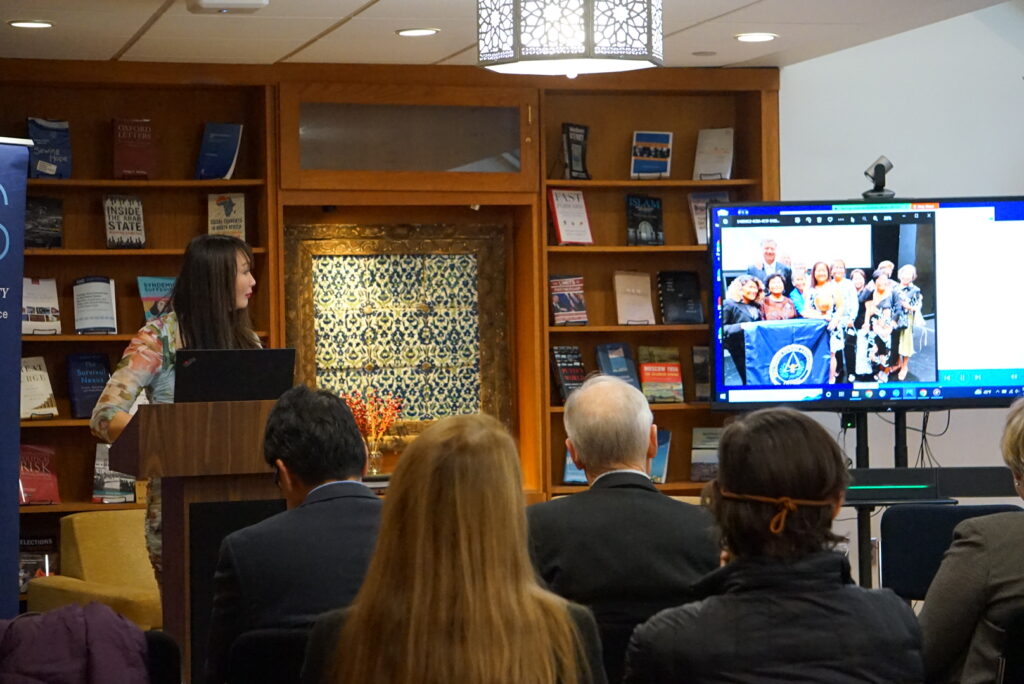
Professor Manalang’s presentation included pictures and a podcast wherein members of the Philippine Nurses Association of Virginia shared their personal experiences as frontline workers during the pandemic. For their work touching and saving lives of the local community, they were recognized by former Virginia Governor George Allen at a ceremony in September 2022
The program held at McGhee Library in Georgetown University in Washington DC was co-organized with the GU’s Institute for the Study of International Migration, the Global Human Development Program and the Asian Studies program.

